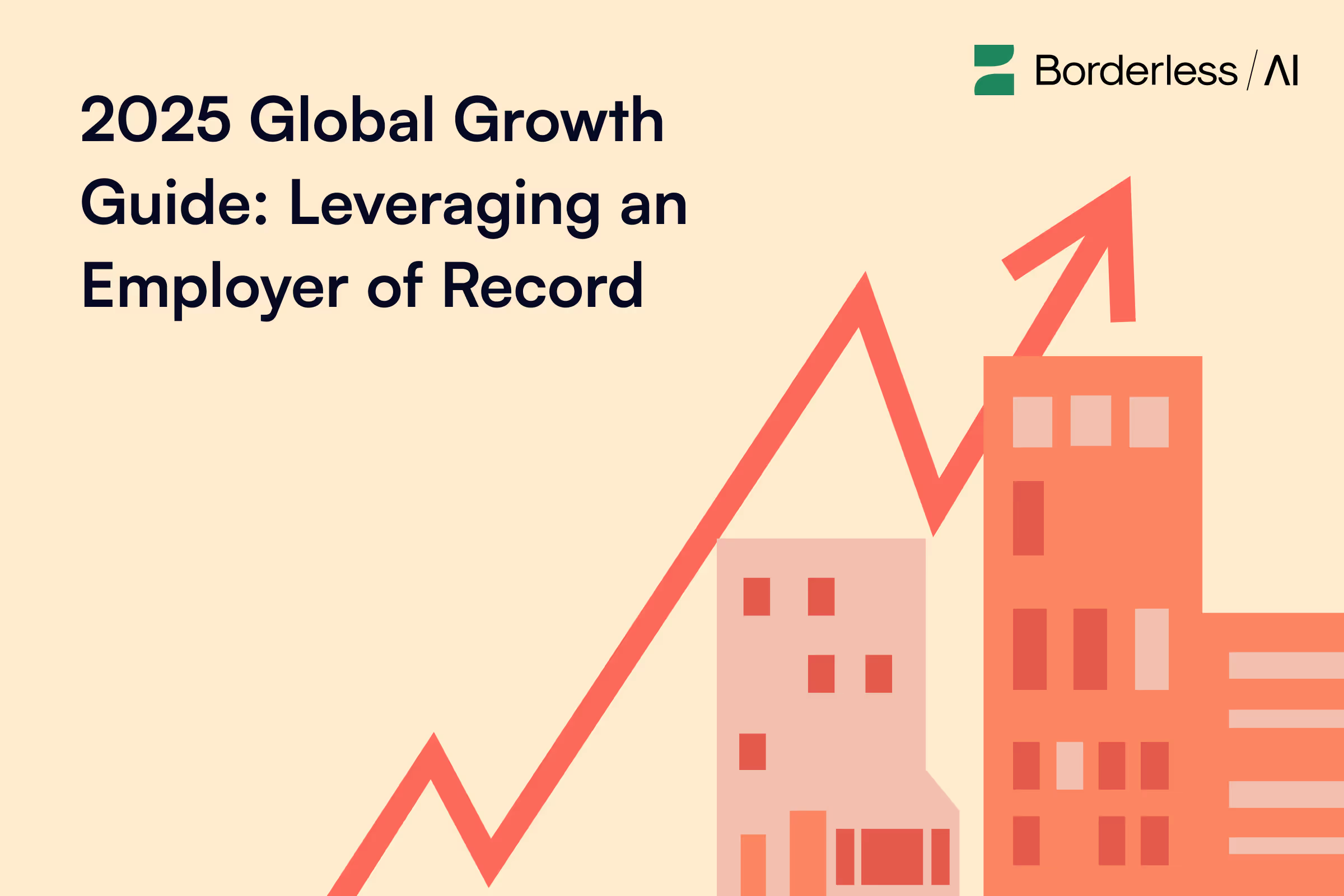In recent years, but especially 2024, companies are increasingly looking beyond their borders to hire global talent and expand their existing operations.
To meet these ever-changing and growing needs, the Employer of Record (EOR) model can undoubtedly be a game-changer. An EOR enables an organization to hire remote employees and build a global workforce, all without the complexities of establishing legal entities in foreign countries.
It’s hard to deny that this innovative approach is revolutionizing the way businesses think about global hiring, and international employment in general.
As employers explore the many possibilities of expanding their team across borders, understanding the ins and outs of EOR services becomes crucial. That’s why our team of industry experts at Borderless AI have put together this helpful guide.
In this guide we will walk you through the key aspects of leveraging an Employer of Record for your global expansion strategy, helping you gain a better understanding of how to assess your readiness for international growth, implement an effective EOR strategy and ultimately navigate the different challenges of managing a diverse global team.
Together, we’ll help you obtain a clear roadmap to harness the power of EOR services and unlock new opportunities in the global market.
Understanding Employer of Record (EOR) Services
What is an EOR?
An Employer of Record (EOR) is a global employment solution that allows companies to hire employees in foreign markets without setting up a legal entity in the respective country.
Acting as the official employer, the EOR takes on all legal and administrative responsibilities linked to employment, all while the client company continues to maintain control over the day-to-day activities of their employees.
Key Benefits of Using An EOR
1. Compliance and Risk Mitigation
An EOR ensures regulatory compliance by adhering to applicable employment and local labor regulations. They possess local knowledge and expertise, allowing your business to maintain a clean legal slate. An EOR will also monitor changing laws, research regulations abroad and even complete mandatory reporting benchmarks related to labor and legal establishment.
2. Time and Cost Savings
By eliminating the need to set up local offices or subsidiaries, an EOR will work hard to help a business to save time and money when expanding into new markets. This efficiency allows companies to focus on core competencies, while also ensuring visa legality and maintaining ethical practices.
3. Access to Global Talent
EORs offer a range of unique solutions that enable companies to recruit in any corner of the globe. This advantage helps overcome geographic constraints and assemble teams that are both highly-skilled and culturally diverse.
4. Streamlined HR Processes
EORs handle various HR tasks, including payroll processing, benefits administration, tax compliance and employment agreement management - to name a few! This comprehensive service reduces HR workloads, saves on overhead costs and also allows employees to better focus on profit-generating activities.
5. Scalability and Business Expansion
Employer of Record (EOR) services can help to streamline your business operations by handling many administrative tasks, allowing you to focus on growth and innovation. These services enable cost-effective expansion of your remote workforce, matching your in-house budget. EOR support can also help you retain top talent, while boosting productivity and minimizing operational expenses.
How EORs Facilitate Global Expansion
1. Rapid Market Entry
An EOR offers a generally faster alternative to traditional methods of hiring international employees. This approach enables employers to better access new global markets rapidly and seize opportunities quicker than their competitors.
2. Simplified Visa Sponsorship
Employer of Record services can navigate the intricate landscape of visa sponsorship, simplifying international hiring and ensuring compliance with immigration regulations. They prepare and submit all required documents, leveraging established relationships with government agencies to expedite the visa process.
3. Onboarding and Support
An Employer of Record platform often offers extensive onboarding assistance to international recruits throughout the visa sponsorship journey, including aid with relocation logistics and
arranging suitable housing. This comprehensive support helps to foster positive relationships and also enhances satisfaction and retention among global hires.
4. Flexibility and Scalability
Employer of Record services enable businesses to hire workers on a temporary or project basis, increasing staffing flexibility. This scalability allows organizations to be agile and get talent to the right places at the right time.
5. Innovation and Technology
Many EORs are taking advantage of the latest and greatest in modern technology. These advancements can help to streamline processes, reduce timelines and save money, all while boosting connectivity across borders.
A great example of innovation in the EOR industry is artificial intelligence (AI). For example, Borderless AI has utilized AI to develop HRGPT, which benefits employers and employees alike. HRGPT is the world’s first AI-powered agent for the global employment industry.
With HRGPT, you can analyze legal contracts, ask employment questions and even draft employment agreements - all with ease and within seconds. By taking advantage of modern innovation and new-age technology, such as AI-powered agents such as HRGPT, you can save both time and money, without compromising on quality, accuracy or integrity.
By leveraging an EOR company, organizations can focus their resources on strategic initiatives and core business functions, while also expanding their global footprint both efficiently and compliantly.
Understanding the Roles of an Employer of Record
Legal Employer
An Employer of Record acts as a legal employer for a remote worker that is hired by a foreign company that does not have a legal entity in that area and wants to hire employees overseas. As an expert in the local market, the Employer of Record will handle legalities regarding payment and taxes, while also disputing a resolution for your remote workers on your behalf.
Payroll and Tax Management
An EOR will manage the payroll and tax obligations for employees, helping to ensure that they are compliant with all local labor laws and employment regulations. Not only will they handle the payroll preparations, but they will also ensure that the salaries are paid on time and handle tax withholding and filing for all employees.
Employee Benefits Administration
An Employer of Record will also manage the administration of employee benefits. This includes medical benefits, healthcare, insurance, retirement plans, and bonuses for eligible employees. They will also provide and manage the statutory benefits, per the local regulations.
Compliance & Risk Management
As the employer of a remote, global team, compliance and risk management are exceptionally important. An EOR can help to protect your employees and remote operations from both legal liabilities and compliance risks.They can handle employment-related risks, such as workplace disputes and wrongful termination claims, to help ensure both workplace safety and liability mitigation.
Human Resource Support
Your Employer of Record can administer a range of human resources (HR) services. This includes but is not limited to onboarding, termination and onboarding. Not only can they govern contracts and non-disclosure agreements, but they can also help to maintain your employee records and documents, too.
Evaluating Your Global Expansion Readiness
Assessing Your Hiring Needs
Before beginning a new approach toward global expansion, evaluating your hiring needs is imperative. As your business grows, so does the demand for new talent.
Employers should absolutely consider whether their current HR department has the capacity to handle a time-consuming recruitment process. If not, they may want to explore staffing services that can provide comprehensive solutions for effective workforce management.
When assessing your hiring needs, consider the following:
- Recruitment: Identify, attract and select individuals with the necessary skills and qualifications. Please note that an EOR does not recruit talent on your behalf.
- Onboarding: Ensure a seamless integration of new hires into your company culture.
- Training and Development: Implement programs to maintain a successful workforce strategy and foster employee retention.
Analyzing Target Markets
To identify potential target markets for global expansion, you need to conduct thorough market research.
This can involve:
1. Analyzing Market Trends: Study consumer behavior and demand patterns in various countries.
2. Exploring Cultural Differences: Understand local preferences and adapt your offerings accordingly.
3. Segmentation Strategies: Identify niche markets and tailor your products or services to meet specific needs.
When evaluating market potential, consider factors such as economic indicators such as GDP, GDP per capita, inflation, and median income. These factors can actually help you gauge the size of an economy and the opportunities it may offer.
Considering Legal and Compliance Factors
It’s important to consider that expanding into a new market can come with a host of legal and compliance considerations.
Here are five key factors to keep in mind:
- Taxation: Understand the diverse taxation systems across different countries.
- Labor Laws: Familiarize yourself with employment contracts, worker rights and collective bargaining agreements in your target markets.
- Trade Regulations: Be aware of import and export tariffs, non-tariff barriers and customs procedures.
- Intellectual Property Protection: Research the varying levels of IP protection in different countries.
- Data Privacy: Comply with local requirements regarding data privacy registration, data transfer obligations and customer/employee notifications.
By carefully evaluating these aspects, you can better prepare your business for successful global expansion and even mitigate potential risks. For more information when navigating legal and compliance factors while working across borders, refer to this helpful guide!
Implementing an EOR Strategy
Selecting the Right EOR Partner
To implement an effective EOR strategy, you first need to choose the right partner.
Start by evaluating your business goals and aligning them with a potential EOR company. Look for an EOR that can help you enter your target market swiftly and cost-effectively. Ensure they have a team of HR specialists, legal experts and compliance professionals - all with in-depth knowledge of regional employment laws.
When selecting an EOR, you should consider the following:
- Transparent pricing structures for better financial planning
- Ability to reduce time spent on administrative tasks
- Willingness to take on financial and legal responsibilities
- Up-to-date knowledge of local tax laws and compliance standards
- Understanding of regional cultures and business practices
- Ratings from past and existing customers
- How innovative and user-friendly their tech is, including artificial intelligence
- Overall employee experience
- Customer support and responsiveness
- Legal expertise to help hire international employees
To make an informed decision, request comprehensive proposals from shortlisted providers, verify their credentials and evaluate their technological infrastructure.
Onboarding International Employees
Once you've chosen an EOR to partner with, you should next focus on onboarding your international employees. A successful global onboarding process should introduce new hires to the company and set them up for professional success.
Consider the following steps:
- Start with pre-boarding to ensure new hires have everything they need, from day one
- Be mindful of time zones when scheduling virtual meetings
- Understand and respect cultural differences
- Allow new employees to move at their own pace
- Be inclusive by providing various ways to learn and access information
- Celebrate diversity and educate new hires on their role in the company
- Introduce new employees to your team and schedule regular check-ins
Managing Payroll and Benefits
Effective payroll and benefits management is crucial when implementing an EOR strategy.
Your chosen EOR should handle various responsibilities, such as:
- Calculating and distributing employee wages
- Managing payroll taxes and ensuring compliance with labor laws
- Administering benefits and handling deductions
- Managing payroll-related paperwork and generating reports
With help from an EOR in these areas, you can save time, money and resources while ensuring accuracy and compliance. The expertise of an Employer of Record in local regulations and tax requirements will help you navigate the complexities of international payroll management.
Remember, implementing an EOR strategy allows you to focus on your core business activities while the EOR handles the administrative and compliance aspects of employing international workers.
Emerging Trends in the EOR Industry
1. Market Growth and Expansion
The EOR industry is experiencing significant growth, with impressive projections for the coming years. This growth highlights the rapid expansion and increasing importance of EOR services in the global business landscape.
2. The Integration of Artificial Intelligence (AI)
It’s hard to deny the technological advancements in the EOR industry when it comes to Artificial Intelligence (AI). User-friendly web apps, platforms and integrated contract management systems are becoming more common, streamlining processes for both employers and employees.
As mentioned before, at Borderless AI we are proud to provide our customers with a dedicated approach to this technology, with HRGPT.
HRGPT is designed specifically for the global employment industry. Employers can create contracts, ask questions and even analyze legal agreements - all within seconds.
For more information about the impact of AI on the global EOR industry, read this helpful guide!
3. Expanded EOR Service Offerings
Some EOR providers are evolving to offer more comprehensive services beyond traditional employment management.
These expanded offerings can include:
- Immigration support, such as visa and work permit sponsorships
- Specialized services like IP and invention rights protection
- Enhanced employee benefits, including stock options and moving bonuses.
Some providers are even partnering with online learning platforms to offer learning and development resources, creating a more holistic approach to global employment solutions.
4. Focus on Compliance and Global Expansion
The role of EOR services is shifting from purely tactical to more strategic purposes. There is a growing emphasis on ensuring compliance with local labor laws across different countries, reflecting the complexities of global employment.
This enhanced focus on compliance, coupled with the ability to facilitate global expansion, positions EOR services as key enablers for companies looking to establish an international presence or manage a global workforce more effectively.
Contact Borderless AI Today: Book Your Demo
Unlock the potential of cutting-edge technology with Borderless AI!
Whether you're looking to enhance your business operations, hire international employees, streamline processes or innovate with the latest in artificial intelligence, our team is here to help. Reach out to us today to book a demo and discover how our tailored solutions can transform your vision into reality.
Don't wait - take the first step towards a smarter future today! Contact Borderless AI and let's create something extraordinary together.









